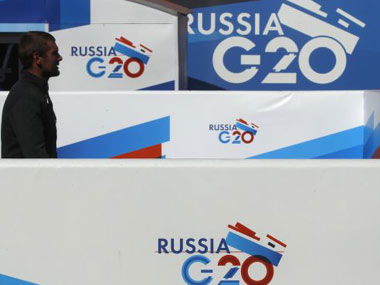New York: For the first time in years, the annual G-20 summit won’t be dominated by the Eurozone’s debt crisis. Instead troubles in emerging markets may dominate the meeting. The emerging markets will push their case for better global co-ordination to tackle recent market mayhem and currency volatility in emerging markets, officials said on Tuesday, ahead of the G-20 summit in St Petersburg, in Russia, this week.
India, Turkey, Brazil, Mexico and South Africa are among the G-20 member nations whose currencies have tumbled as investors have pulled back from emerging markets in recent months in anticipation of an expected cutback in US Federal Reserve stimulus.
[caption id=“attachment_1083515” align=“alignright” width=“380”]  Preparations for the G-20 Summit. Reuters[/caption]
A person familiar with Brazilian President Dilma Rousseff’s thinking told The Wall Street Journal that Brazil hopes the summit on Thursday and Friday will produce agreement on ways to ease the impact of the anticipated change in US Fed policy.
“The tone of her speech at the summit will show how upset she may be with US policies,” a Brazilian government official told The Wall Street Journal.
Brazilian officials said they have the backing of other developing countries in seeking moves to address recent currency volatility. In particular, they want the US Federal Reserve to “improve the way it communicates its intentions to reduce market swings.”
Minutes from a meeting of Fed policymakers released last month indicated they are still on track to slow the US central bank’s $85 billion bond-buying program this year and end it in mid-2014, but gave no signal whether the scale-back could begin in September.
Impact Shorts
More ShortsHowever, some investors are betting the Fed will start winding down its $85 billion per month bond buying purchases by $20 billion at the September 17-18 policy meeting. That belief already has drawn billions of dollars in capital back from emerging markets like India, Brazil and China to US assets with investors seeking the relative safety of US equities. There are fears that emerging market currencies are set to depreciate further when the Fed starts tapering its bond-buying program.
“Decisions taken by countries based solely on their own national interest can have serious implication for other nations,” South African President Jacob Zuma’s office said on Monday.
“There must be a greater recognition that we live in an interconnected world.”
Closer to Creating Emergency Reserve Fund
The governments of Brazil, Russia, India, China and South Africa have beenworking to set up a $100 billion Contingency Reserve Arrangement (CRA) bypooling central-bank reserves.
“It’s good to have such a multilateral reserve arrangement and on the working level, we have achieved good progress,” Chinese Vice Finance Minister Zhu Guangyao said ahead of the G-20 meeting.
In March, the finance ministers of the BRICS grouping signed an agreement to kick-start the CRA during their annual meeting in South Africa. China will contribute $41 billion from its central bank reserve, followed by Brazil, Russia and India with $18 billion each, and South Africa with $5 billion, aBRICS official said.
Rout in emerging markets could spark a crisis for US banks
“Other than a vague commitment to take into account the effects of its monetary policy on other countries, the Fed is in practice likely to make noconcessions to developments elsewhere,” said Capital Economics, a Londonbased research firm.
However, analysts have pointed out that the Fed might want to consider as it exits its bond buying program that the growing rout in emerging markets may create a widespread financial crisis. US banks have a big exposure to emerging markets and shares of bank stocks have already fallen 4 percent in the past month as the situation in emerging markets has got worse.
“What really drives financial crises, or shocks in the market on fears of them, is not lower revenue, but how much banks could lose if those markets continue to tumble,” said Fortune magazine.
In its financial statements, JPMorgan Chase includes China, Brazil, India, and Malaysia among the countries where it says it has the biggest exposures.
The bank says it could lose over $50 billion in those four countries, or about a quarter of its total capital if things went awry.
Morgan Stanley, for instance, says in its financial statements it could lose as much as $4.6 billion if all its bets and loans in Brazil went bad, and another $3 billion in China.
“As of the end of last year, Citi said its potential losses in the emerging markets were minimal even in a worst case scenario. It put its total exposure to Brazil and India at $6.2 billion. But, again, that’s after hedges.Go back to the government’s figures, and total outstanding investment in those two countries is more like $54 billion, which if it all went bad would wipe out a third of Citi’s capital,” reported Fortune.
Things in India have been particularly bad as the rupee has suffered the most-precipitous decline among large Asian economies, plunging 20 percent against the dollar since May.


)

)
)
)
)
)
)
)
)



